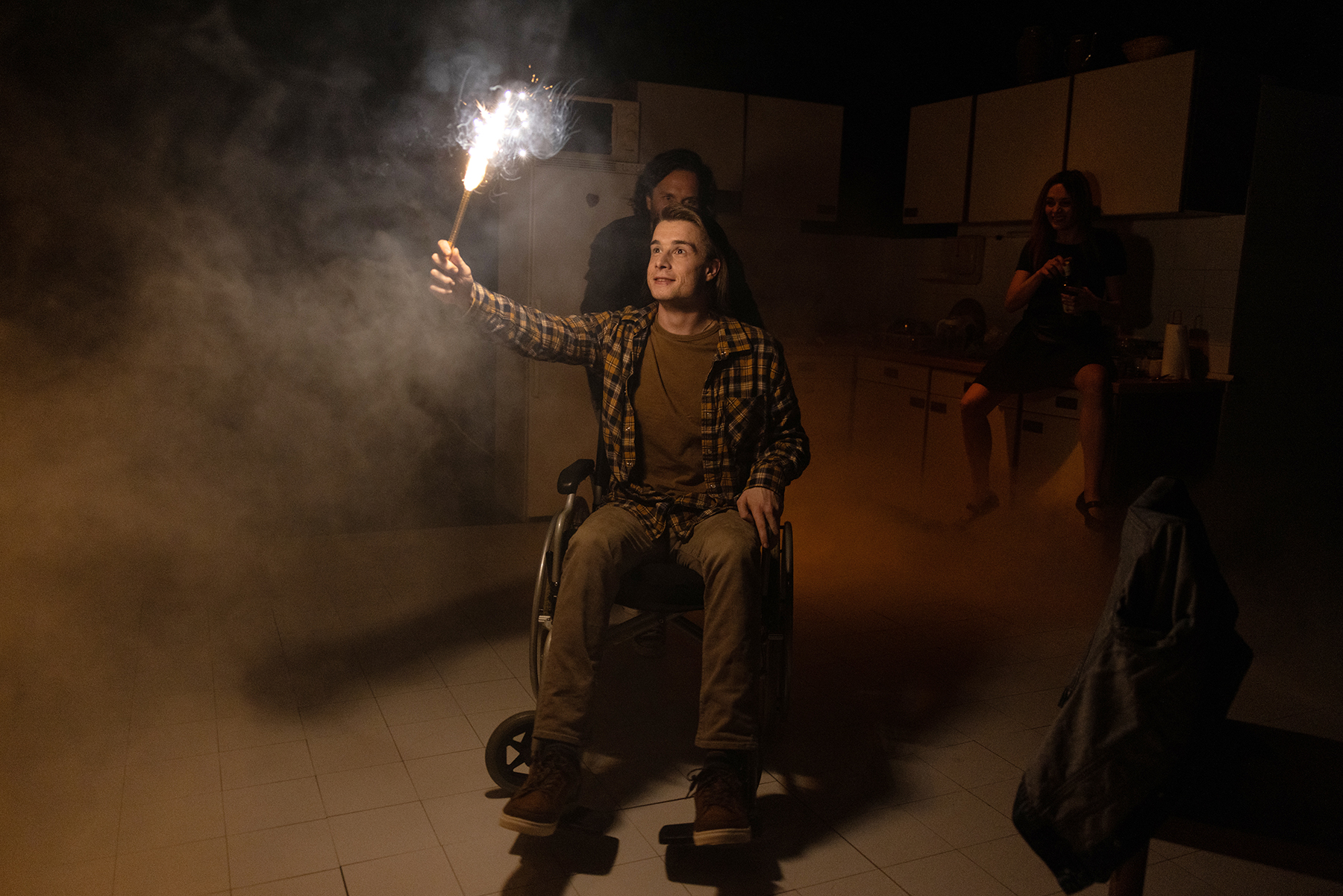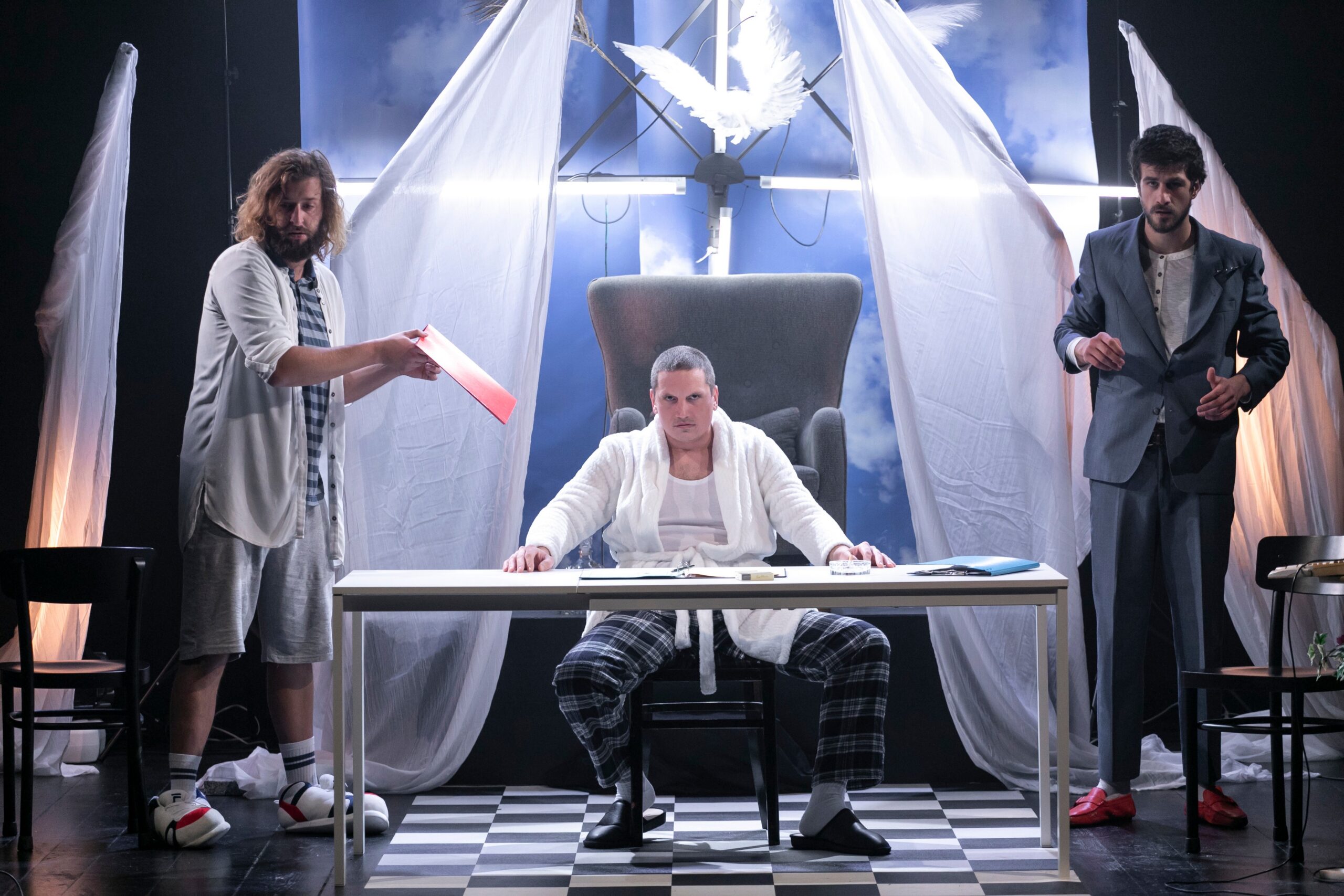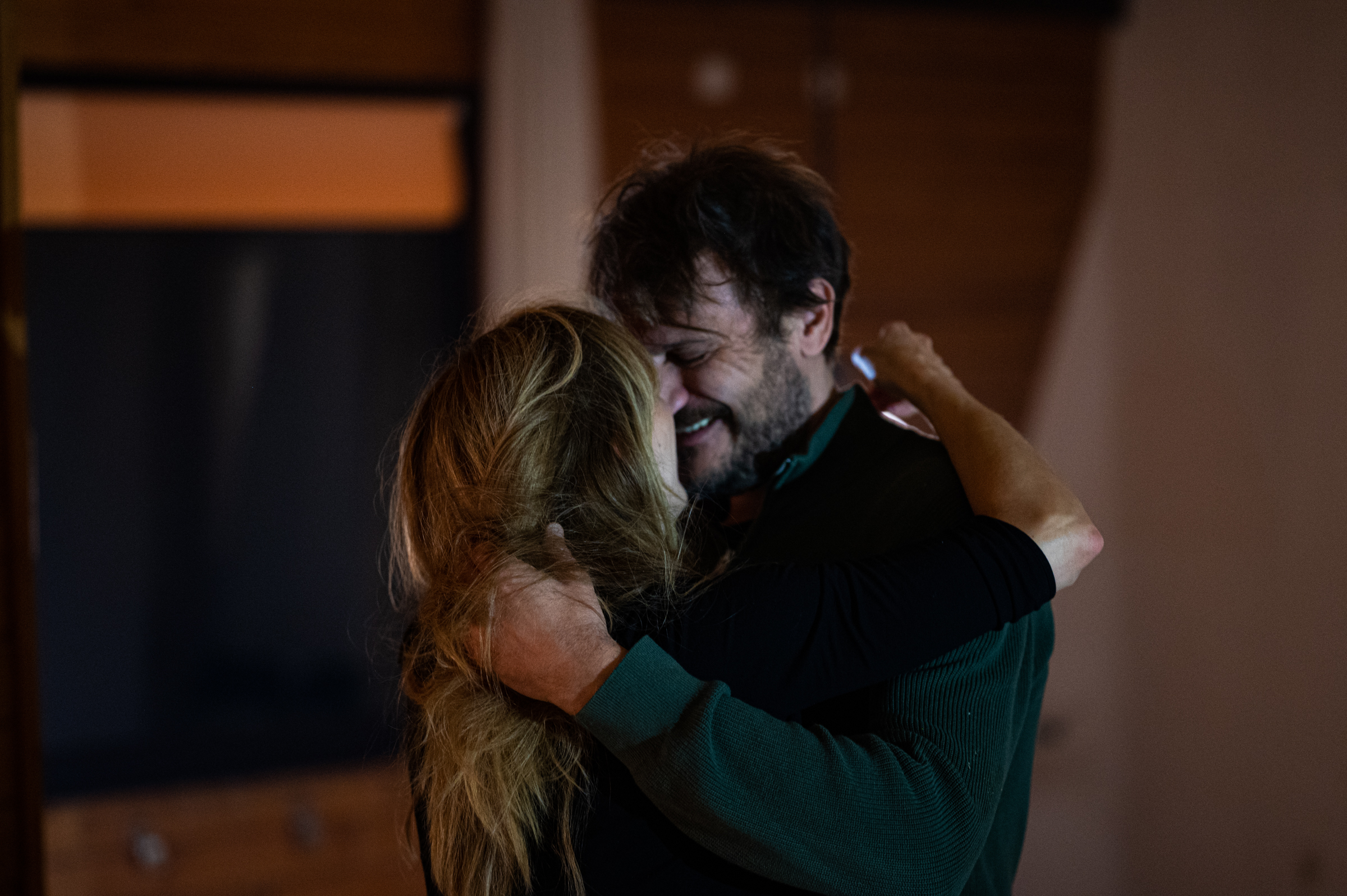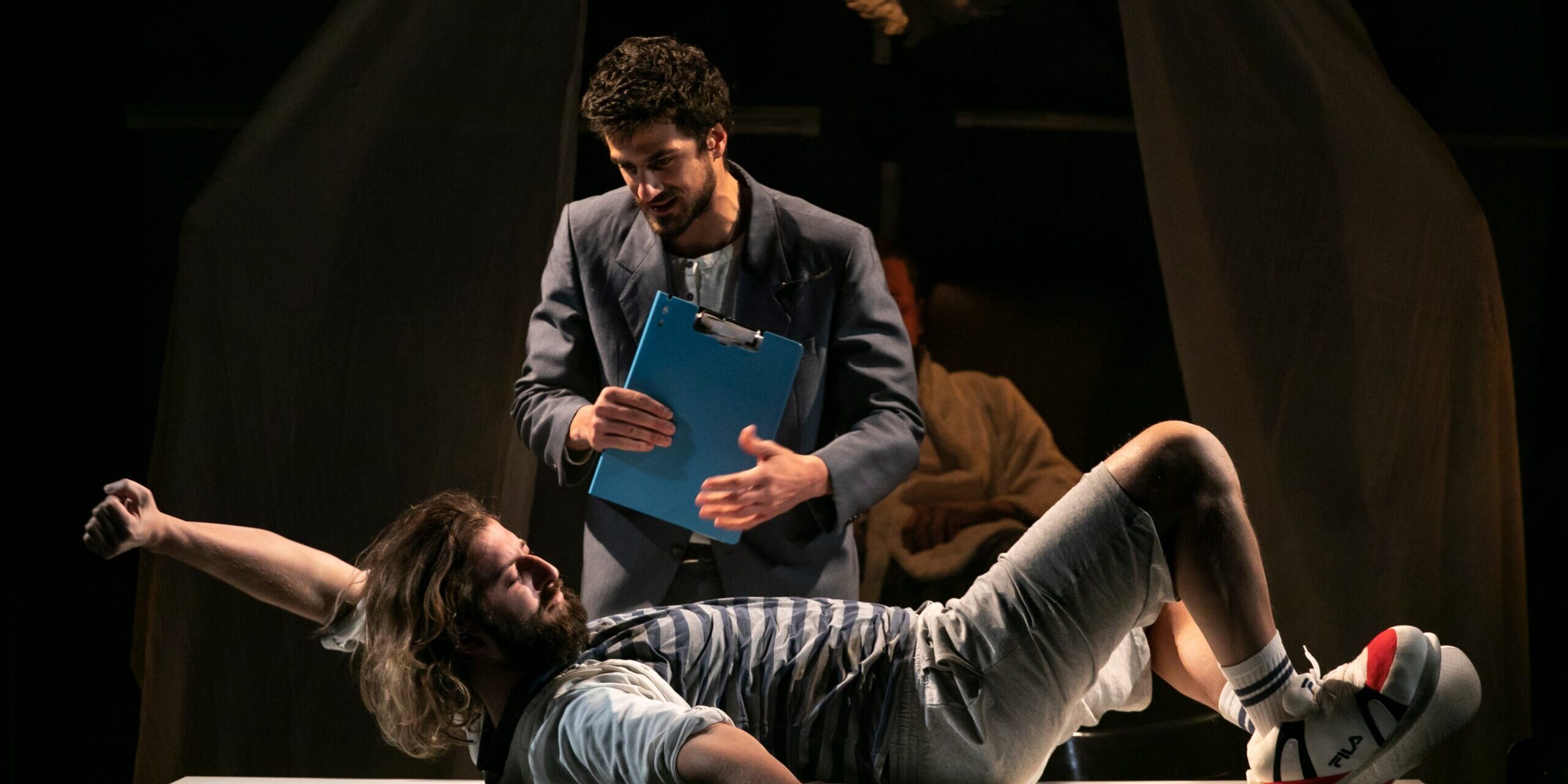Showcasing the best in Croatian drama, the 33rd Marulić Days Festival was held from 21st to 28th April in Split. Nora Čulić Matošić reports on the highlights including a nuanced play by Ivor Martinić and a comedy about God.
With its focus on Croatian playwrights and drama, the Marulić Days Festival, which took place this year between the 21st and 28th April, is a great opportunity to assess the current state and trends of Croatian theatre.
This 33rd edition featured 11 theatre productions from Croatia as well as productions from Slovenia and Bosnia and Herzegovina that are based on Croatian dramatic texts. The programme was interesting and diverse in terms of the ways in which the dramatic texts were staged. Some directors combined theatre with other art forms like film or music. 55 square meters, Ivana Vukovic’s play about the realities of life in Split during the tourist season, included live recorded video in the performance, while Kunst Teatar’s Sloboština Barbie, SNG Drama Ljubljana’s Cabaret Kaspar and Night with Aleksa are conceptualized as live music performances, utilising elements of gig theatre and cabaret.
Thematically, the main subject was conflict. Some shows dealt with the issues of war and the effect it has on people’s lives, like the monodrama Franz, written by Tomislav Zajec and based on the life story of Franz Jägerstätter, an Austrian conscientious objector during World War II.
Others thematized conflict more intimately and personally, the conflict that occurs between family members, romantic partners and close friends My Son Just Walks a Little Slower is a good example of this, a wonderfully written text by Ivor Martinić produced by Sarajevo War Theatre SARTR. The director Ivan Plazibat and the ensemble have created an excellent production of Martinić’s heavy yet wholesome slice-of-life family drama exploring how the sickness of one person can affect a whole family.
This text is very popular – it’s one of the most awarded plays in the history of Croatian theatre. As always, Martinić manages to express an entire spectrum of emotion through his characters and their dialogue without obfuscating the main plot. His characters are well-rounded, layered, and immensely relatable in their interactions with each other; when there’s conflict in his plays, it’s shown in a healthy way that feels honest and heart-warming.

My Son Just Walks a Little Slower
The plot of My Son Just Walks a Little Slower takes place over the course of one day, the 25th birthday of Branko (played by Enes Kozoličić), the son of the title. In fact, Branko doesn’t walk at all – he used be able to get about with the help of crutches, but now he uses a wheelchair. Branko’s illness casts a shadow over the rest of his family; it effects every member in a particular way. His father Robert (Jasenko Pašić) is cold and distanced, preferring to be by himself; while his mother Mia (Snežana Bogićević) tries to put on a happy face while taking care of her sick son and her sick mother Ana (Jasna Diklić). Ana barely eats and is also senile; she walks around the house asking about her ex-lovers, all of whom are now dead.
Daughter Doris (Matea Mavrak), Branko’s sister, is a cheerful girl who’s head over heels in love with Tin (Adnan Kreso) and is often seen smiling at her phone screen while she’s presumably texting her crush. Doris is the only one in the family who displays true joy (probably because she’s in love) and tries to keep everyone’s spirits high, most notably those of her brother Branko. However, she feels neglected because of her mother – Mia makes her daughter feels guilty for having such a positive and vital outlook on life and shames her for being happy in a passive aggressive manner. Mia really struggles to find meaning in her hard and painful life. She’s in denial about Branko’s condition and can’t reconcile with the situation in which she finds herself. This is best shown in a scene when she wants to take a birthday photograph of Branko to send to relatives and asks him to stand up for the picture. It’s so sad and painful to watch as Branko clings to the fridge, trying to smile and stand while his mother moves the wheelchair out of the frame.
The stage set design by Vedran Hrustanović consists of a realistic kitchen with wooden furniture on one side of stage and two armchairs on the other. The fantastic light design by Nedim Pejdah masterfully paints the changes in emotional intensity, especially when charaters are supposedly sitting in the dark. The darkness emphasizes the nausea the characters feel in the house, it suffocates them. For me, even though it did not win any awards at the festival, I consider it to be the best show of this year’s edition.

So Help Us God
Another stand-out performance at this year’s edition also revolving around family conflict was So help us God directed by Hrvoje Korbar and produced by PlayDrama Split, a play inspired by the book Summa atheologiae written by Boris Dežulović. Dežulović is a notorious Croatian journalist, mostly known by his satirical texts and newspaper columns in which he creatively critisizes the government and society, in this case with a particular interest in religious hypocrisy, more specifically within the Catholic faith. His language is harsh, and he spares no one in his commentary, especially those in power. The main characters in the play are well known to the audience – God (Stipe Radoja), Jesus Christ (Donat Zeko), The Virgin Mary and Archangel Gabriel (both played by Stipe Jelaska). The first three make a dysfunctional family where God is an authoritative father, Jesus acts like a teenager and Mary is rarely home because she likes to appear to people around the world. All four of them make chaotic business partners too. Jesus is very chill and friendly, he likes people and his mother Mary but is scared of his father God and constantly clashes with him about the direction of their establishment which he finds out-of-date and boring. He tries to modernise the church and suggests they set up a Twitter account or create an app. Whereas, God on the other hand is sceptical towards his son’s ideas and the human race in general. He’s in such a bad mood in fact that Gabriel fears it may cause the end of the world. What triggers God the most is mentioning his name in vain and this is where the title of the play comes from – traditionally, when a new president of Croatia is elected, they end their oath with ‘So help me God’.
Radoja was awarded a ‘Marul’ for his performance as God and Jelaska won an award from daily newspaper ‘Slobodna Dalmacija’ for the best actor during the festival for his performance. The play also won the audience award. All three actors are very skilled, with Jelaska superbly portraying the very different characters of Gabriel and Mary. The characters in the play are written as if they were from your local neighbourhood; they seem so real and familiar which adds to the comedy. I haven’t laughed as much in a long time watching a Croatian play as I did here.
The chemistry between the actors is superb; they are clearly having a lot of fun doing this show. The majority of the humour comes from trivialization of the religious figures, making them more human and relatable. The scenography and costumes by Katarina Perić adds to the comedic feel – God wears a white bathrobe and pyjama bottoms with house slippers.
Through the satirical commentary, based on Deželović’s writing, Korbar manages to assemble different columns with the same religious motifs into an entertaining comedy that makes audience feel like they are seeing their everyday reality in a mirror.

There are some worlds at the bottom of the ocean
The most awarded play of the festival was There are some worlds at the bottom of the ocean which won the best artistic achievement for actors Frano Mašković and Anita Matić Delić’s acting co-play and best dramaturgy for the joint work of the actors, director Romano Nikolić and playwright Olja Lozica. The show is a contemporary adaptation of Medea where Medea and Jason are imagined as a normal married couple whose fairy tale family life slowly turns into a violent nightmare. Normally when it is performed in Zagreb, the play is staged in a house or apartment that amplifies the domestic atmosphere and puts the spectators as close as possible to the couple. There was an attempt to replicate this closeness on the stage of the City Puppet Theatre of Split, and they more or less succeeded in the attempt. Besides the actors, there’s a small aquarium on the stage with a single gold fish that is sometimes the only moving subject on the stage. The gold fish, perhaps, alludes to wishes which initially came true, but did not last – a happy marriage ’till death do us part, a loving family which will never be torn apart. Mašković and Matić Delić eat apples from a bowl on the dinning table – a common symbol of sin and discord. The more they eat, the more tense they get.
This reading of Medea focuses more on the relationship between the two former lovers and the inevitable doom of their relationship. The collapse of Medea and Jason’s marriage plays out without theatricality and long dramatic dialogues. Their lines mostly consist of repeating the same sentences, as if they were doing a Meisener exercise. Although at first it may seem that there’s no actual plot, it’s embedded in the text itself. Both of them express identity crises, particularly Medea who has given up everything (and everyone) she had for Jason. She’s frustrated with his laziness – he casually reads newspaper headlines while she cleans the carpet. Medea asks herself who is she when she’s alone, who is she when she isn’t part of a ‘we’. She can’t even express her anger and discontent with her life properly – she lets it all out by putting her head in the aquarium. They relentlessly go from a loving, romantic love birds to violent, aggressive monsters. The infanticide itself is not shown; towards the end, Medea seemingly drinks what seems to be a cup of cocoa, but the streams that run from Matić Delić’s mouth are dark red in colour.
On the opening night, the Marin Držić award ceremony was held where in total six authors were rewarded. The first prize went to Davor Spišić’s Woman Anthem (Žena Himna), the second prize equally share Edi Martin for Vulnera urbis, vulnera orbis and Espi Tomičić’s Dance on No. 60 (Ples na broju 60) and the third prize is also shared between three writers: Katja Grcić for Other (Druga), Hana Konsa’s Stay (Ostanak) and Ana Maras Harmander for You don’t have an exclusive right for suffering (Nemaš samo ti ekskluzivu na patnju). These texts shared in an interest in women’s position in a traditionally patriarchal society and ways of dealing with traumatic and violent experience.
Other plays that have been awarded the festival’s award ‘Marul’ include 55 square meters which took the award for the best play in general and for the best acting accomplishment by Arijana Čulina for her role as Fani, Cabaret Kaspar for best direction by Marijan Nečak and Traffic light by Petra Cicvarić for best contemporary dramatic text featured during the festival.
For more information, visit: Marulicevidani.hnk-split.hr
Further reading: interview with Ivor Martinić: “Dramaturgs are the most underestimated part of theatre”
Further reading: review of 55 Square Meters
Further reading: review of Sloboština Barbie
Nora Čulić Matošić (1998) is a student of Comparative Literature (MA) at the Faculty of Humanities and Social Sciences in Zagreb. She has written theatre criticism for the Croatian radio programme Theatralia and web portal Kulturpunkt.hr. Besides theatre, her interests are other forms of performing arts (particularly dance performances) and film.








